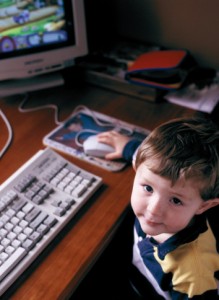Keeping Kids Safe Online
 When your kids are small, keeping them safe tends to consist of things like keeping tiny Legos off of the floor, covering the electrical outlets and not leaving them unattended in the bathtub. As they grow, though, kids gain more freedom and, as any mom knows, freedom in kids equals concern in parents. Most kids have access to the Internet — if not at home, then at school. We’ve all read scary stories about predators that seek out victims in kiddie chat rooms and things like that. Short of locking them in a technology-free closet, how can we keep them safe?
When your kids are small, keeping them safe tends to consist of things like keeping tiny Legos off of the floor, covering the electrical outlets and not leaving them unattended in the bathtub. As they grow, though, kids gain more freedom and, as any mom knows, freedom in kids equals concern in parents. Most kids have access to the Internet — if not at home, then at school. We’ve all read scary stories about predators that seek out victims in kiddie chat rooms and things like that. Short of locking them in a technology-free closet, how can we keep them safe?
Supervision and open communication are key, according to the experts. Keep the computer in a common area, such as a dining room or family room, as opposed to in an office with a door or your child’s bedroom. Talk to your kids about the importance of safeguarding his personal information. He should never use his real name on web chats, and should never give anyone his address, phone number or email address without clearing it with you first. Consequences for breaking those rules should be swift and dramatic; losing Internet access for a month or more would not be unreasonable!
Here are a few more tips on Internet safety for kids:
- Know which sites your kids are frequenting. Let your children know that you are milling around when they’re on the computer, and periodically stop by the computer area to take a look at what your child is doing. This not only can help prevent someone from preying on your child, but can also prevent your child from participating in cyber-bullying and other criminal or mischievous acts.
- Follow the rules. Many preteens want Facebook pages, but the site itself stipulates that users must be 13 years old or older. Show your kids that you’re serious about Internet safety and rules by standing by these requirements. If your child is under 13, there will be certain websites that he’ll need to wait to use.
- Keep tabs on where your child has been. Check the browser history to be sure that all of the sites visited are kosher. Impose consequences for wandering outside of agreed-upon websites.
- Consider knowing your child’s passwords when it comes to email and social media accounts. Particularly if your child is a preteen or young teenager, safety may trump privacy. Allow your teen to change the passwords only when you feel comfortable that he is trustworthy.
- Look into the various software programs available for implementing parental controls. You can’t be there every minute, but a program that tracks your child’s virtual whereabouts and prevents him from opening questionable websites puts a buffer between him and the big, wide open Internet.
- Talk to the parents of your child’s friends. Chances are great that they have similar rules at their houses, even if your child would love for you to believe otherwise. See if you can get a group of parents to agree to rules that will make you feel comfortable letting your child use the Internet at their houses. This also eliminates cries of, “but Johnny’s mom lets him…”
The Internet is a big place, but it does not have to be a scary place. With some safeguards, common sense and open communication, your child can begin navigating the World Wide Web without much chance of getting into trouble.
How do you keep your kids safe online?








